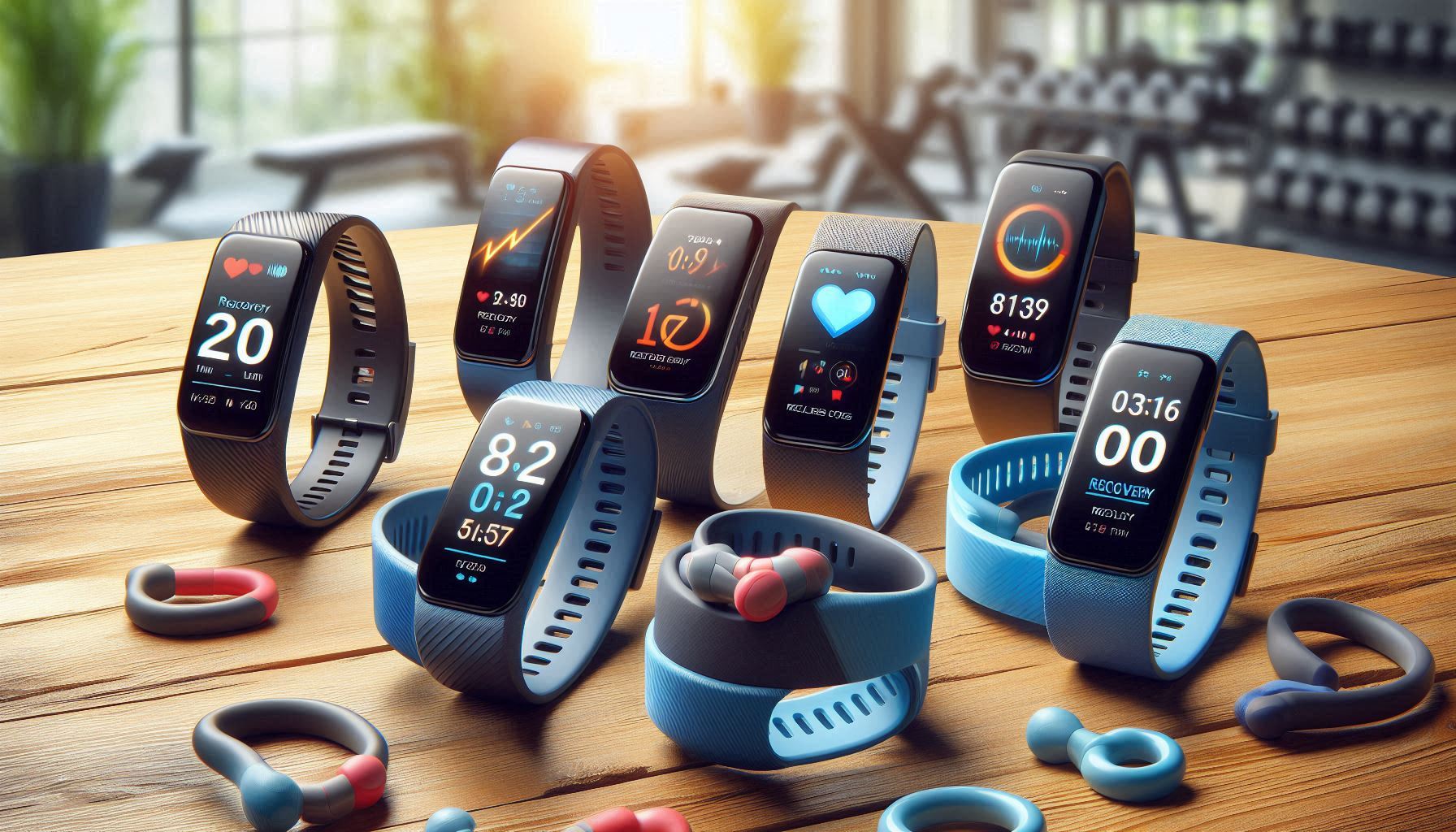A huge, warm welcome to Vertevia.com. Do you currently use a fitness tracker? This article will be looking at the Top 5 Fitness Trackers With Recovery Scores. Please et us know in the comments section below which type of fitness tracker you are using or plan to buy in the future. Right, let’s begin!
Introduction
In the fast paced world of fitness and wellness, recovery is no longer a secondary thought. It’s essential. Whether you’re a professional athlete or a weekend warrior, the way your body bounces back from stress, workouts, and daily strain directly affects your performance, progress, and overall health. That’s where recovery scores come into play. They give you a data driven snapshot of how ready your body is for physical activity, helping you avoid overtraining, fatigue, and even injury.
Today’s top fitness trackers offer recovery insights powered by heart rate variability (HRV), sleep quality, and activity levels. These tools aren’t just about counting steps or calories anymore. They’re about optimizing your life. In this guide, we’ll review five of the best fitness trackers with reliable recovery scores, break down their features, compare their pros and cons, and help you choose the right one for your lifestyle.
Why Should You Monitor Your Recovery Score?
Monitoring your recovery score is about more than just rest. It’s about training smarter. Your recovery score uses biometric data like HRV, resting heart rate, respiratory rate, and sleep cycles to determine how ready your body is for physical stress. A low score might indicate poor sleep, lingering fatigue, or a higher risk of injury. A high score means your body is well recovered and ready for exertion.
By tracking recovery, you can optimize your training load, schedule rest more intelligently, and even prevent burnout. Whether you’re training for a marathon, trying to improve your health, or just want to feel more energetic throughout the day, knowing your recovery score puts you in control of your general well being.
Top 5 Fitness Trackers With Recovery Scores
1. WHOOP 4.0
- Price: $30/month (with 12 or 24 month membership)
- Key Features:
-
- Recovery score based on HRV, resting heart rate, and sleep
- Strain and sleep coaching
- Skin temperature and blood oxygen tracking
- Haptic alarms and smart wake
- No screen, discreet, minimalist design
Benefits:
WHOOP 4.0 is laser focused on performance optimization. It continuously tracks your biometrics to calculate a daily recovery score, helping you understand when to push and when to rest. Unlike many other trackers, it offers strain guidance, giving you targets based on how recovered your body is.
Pros:
- Industry leading recovery insights
- Excellent app experience with in-depth analysis
- Comfortable for 24/7 wear
- Personalized coaching
Cons:
- Subscription required
- No display (not ideal for real time glance)
- No GPS or step tracking
2. Oura Ring Gen 3
- Price: $299 + $5.99/month subscription
- Key Features:
-
- Readiness score based on HRV, temperature, sleep, and activity
- Sleep tracking with detailed stages
- HR and HRV tracking throughout the night
- Lightweight and discreet design
- Up to 7 day battery life
Benefits:
The Oura Ring provides a powerful combination of biometric tracking and user friendly insights. Its readiness score functions as a recovery score, showing how well your body has recovered overnight. The ring format is comfortable and ultra discreet, perfect for people who don’t want a wrist worn device.
Pros:
- Accurate and science backed recovery score
- Excellent sleep tracking
- Stylish, discreet form factor
- Long battery life
Cons:
- No screen or step tracking
- Limited to night time HR/HRV data
- Monthly subscription required for insights
3. Garmin Fenix 7 Pro
- Price: Starting at $799.99
- Key Features:
-
- Daily Recovery Time suggestions
- HRV Status and Training Readiness score
- Advanced GPS and multi-sport tracking
- Solar charging (Pro models)
- Pulse Oximeter and Body Battery metrics
Benefits:
The Garmin Fenix 7 Pro is a powerhouse for athletes. It delivers detailed metrics across training, sleep, and stress, and its training readiness score helps you balance intensity and recovery. Garmin also provides a body battery score, which works like a continuous energy meter based on HRV, stress, and sleep.
Pros:
- Rich feature set for athletes and adventurers
- Accurate and actionable recovery scores
- Solar charging on select models
- No subscription fees
Cons:
- Expensive
- Complex UI for beginners
- Bulky for smaller wrists
4. Polar Vantage V3
- Price: $599.95
- Key Features:
-
- Nightly Recharge and Recovery Pro
- Continuous HR and HRV tracking
- Integrated GPS and dual band positioning
- AMOLED touchscreen
- Personalized training and recovery feedback
Benefits:
Polar’s nightly Recharge score combines ANS (Autonomic Nervous System) recovery and sleep quality to gauge how well your body recovered overnight. The Recovery Pro feature goes a step further with daily readiness tests, especially useful for athletes tracking long term progress.
Pros:
- Comprehensive recovery analysis
- Training guidance tailored to your recovery
- Bright AMOLED screen
- No monthly subscription
Cons:
- Shorter battery life with AMOLED display
- Pricier than other wrist trackers
- App can be less intuitive
5. Fitbit Charge 6
- Price: $159.95 + optional Fitbit Premium ($9.99/month)
- Key Features:
-
- Daily Readiness Score (with Premium)
- 24/7 heart rate monitoring
- Sleep score and stress management
- Built in GPS and Google services integration
- Touchscreen display and week long battery life
Benefits:
The Fitbit Charge 6 is ideal for users looking for an affordable way to track recovery. With Fitbit Premium, it offers a daily Readiness Score based on HRV, sleep, and activity levels. It’s user friendly and integrates well with Android and Google services.
Pros:
- Affordable with great features
- Compact, lightweight design
- Good battery life
- Google Wallet and Maps integration
Cons:
- Requires subscription for full recovery data
- Less precise than higher end models
- Limited performance metrics for elite athletes
Frequently Asked Questions (FAQs)
1. What is a recovery score in a fitness tracker?
A recovery score evaluates your body’s readiness for physical activity using metrics like HRV, sleep quality, and heart rate. It’s designed to help you know when to train and when to rest.
2. How often should I check my recovery score?
Daily. Most fitness trackers update your score each morning after analysing overnight data.
3. Are recovery scores accurate?
They’re generally reliable, especially from brands like WHOOP, Garmin, and Oura. However, accuracy can vary based on how well the device fits and collects data.
4. Do I need to pay for a subscription to get a recovery score?
Some trackers (like WHOOP and Oura) require subscriptions. Others like Garmin and Polar include recovery features at no extra cost.
5. Can a recovery score help prevent injury?
Yes. By helping you avoid overtraining and identifying fatigue, it can reduce the risk of injury and improve long term performance.
6. Is HRV the same as a recovery score?
Not exactly. HRV is one of the key components used to calculate a recovery score but doesn’t provide the full context of sleep, activity, or stress.
How to Get the Most From Your Fitness Tracker
To fully benefit from your recovery score, it’s essential to wear your device consistently, especially during sleep when most recovery data is gathered. Make sure the sensor is clean and snug against your skin, and sync your data daily to stay updated.
Also, don’t ignore other wellness metrics. Combine your recovery score with sleep duration, stress levels, and training load. Use the insights to tailor your workout plans. Lower intensity on low recovery days and push harder when you’re fully recharged. Over time, you’ll learn your body’s unique rhythms and optimize your training cycle.
Conclusion
Fitness trackers with recovery scores offer a smarter, more holistic way to train and live well. They help you understand your body’s readiness, improve performance, and reduce the risk of injury. Whether you’re an elite athlete or a health conscious user, monitoring your recovery can lead to real, measurable benefits.
The five options covered here, WHOOP 4.0, Oura Ring Gen 3, Garmin Fenix 7 Pro, Polar Vantage V3, and Fitbit Charge 6, each offer unique advantages. Your best pick will depend on your goals, budget, and how deeply you want to dive into your health data. Choose wisely, recover smarter, and perform at your peak.
Our Thanks!
We would like to express our sincere thanks to you for reading through this article. Hopefully, you have found it helpful in your search for a suitable fitness tracker. If you would like some further reading, take a look through our blog. We have lots more really helpful and informative articles on a range of wearable health tech subjects. You might like our related article which is titled The Best 8 Fitness Tracker Smart Watches.
Let us know which type of fitness tracker device you’re using or considering for the future in the comments section below.
**Here is a bit of transparency. Our website www.vertevia.com does contain affiliate links and Amazon links. So, if you did make a purchase through the website, we may receive a small commission. This is at no extra cost to you whatsoever. It’s just a way for you to support us as we continue to bring you top quality content**
All the best!
Eamon



